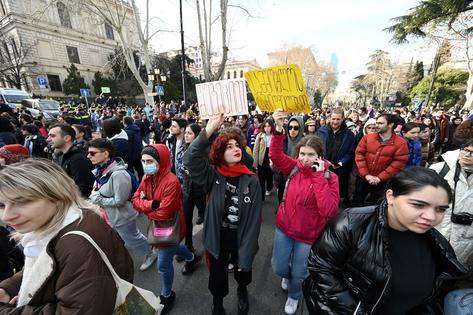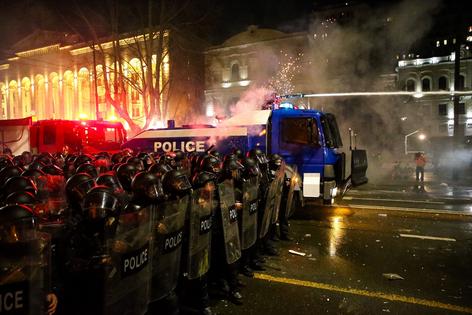Why the growing number of foreign agent laws around the world is bad for democracy
Published in Political News
After several days of mass protests and clashes between protesters and police in early March, the ruling party of Georgia, a former Soviet state located in the Caucasus, succumbed to pressure and abandoned its proposed laws on foreign agents.
But the uproar and media focus surrounding the Georgian initiative and its demise should not mask a greater trend when it comes to such laws, which target foreign-funded media and nongovernmental organizations, or NGOs. Over the past decade they have sprung up in countries across the world. China, India, Cambodia, Australia and Uganda are among the dozens of countries that have “foreign agent” laws on their books.
And a few days after the withdrawal of the Georgian draft laws, Politico reported that the European Union was going to develop its own register of foreign agents.
The impetus for the adoption of these laws in recent years has come from growing international tensions and concerns of national authorities about foreign influence on domestic affairs and public opinion.
The interpretation and application of “foreign agent” laws varies from jurisdiction to jurisdiction. But they all tend to require the registration and singling out of organizations with foreign funding or “influence.” In many cases, their activities are also curtailed unreasonably.
From my experience representing NGOs classified as foreign agents, such laws have the potential to be used as a tool against groups providing human rights and social assistance or monitoring the transparency of government agencies. Any organization involved in any way in international activities and deemed by a state to be influencing domestic policy or public opinion runs the risk of being recognized as a foreign agent.
The legislation in Georgia would have required nongovernmental organizations and media outlets that receive more than 20% of their funding from abroad to be included in a special register of “agents of foreign influence.” They would also need to file an annual financial declaration or face a US$9,500 fine.
The authors of the Georgia bill compared it to the American Foreign Agents Registration Act, or FARA, which applies to any “agent of a foreign principal.”
But critics argued that it was a copy of Russia’s more repressive foreign agents law. Human rights groups say the Russian law allows the Kremlin to obstruct the work of NGOs and independent media, as well as to harass dissenting citizens.
Ever since Russia enacted its foreign agents law in 2012, I have seen how authorities use vague legal concepts like “political activity,” “foreign funding” and “foreign influence” to determine whether an NGO is a foreign agent. These vague legal concepts allow executive authorities and courts to interpret the law as broadly as they like and arbitrarily decide who is or isn’t a foreign agent.
And this broad and arbitrary classification of foreign agents is not unique to Russia. It also applies to foreign agent legislation in more democratic countries. However, the more authoritarian a regime is, the more negative consequences these laws have on civil society.
The first foreign agent law, FARA, was enacted in the U.S. in 1938 to counter Nazi propaganda. This law is still in force today but has undergone significant changes. The concept of propaganda has disappeared from it, and its stated purpose is to identify foreign influence in the U.S. and address threats to national security.
While FARA does not create repressive restrictions on civil society, it can be interpreted extremely broadly if desired. The large number of advisory opinions that the FARA unit has issued on individual requests indicates how difficult it can be to determine who should register as a foreign agent.
In drafting their own foreign agent legislation, Russia and Georgia both referred to FARA. However, there is a key difference between their legislation and FARA: In the Russian and now-abandoned Georgian versions, “foreign agents” do not need to carry out activities on behalf of a foreign government, political party, business or individual.
As such, the use of the terms “foreign agent” and “agent of foreign influence” is incorrect from a legal point of view – agency activity does not even need to be proved.
Nonetheless, the legal consequences are very real for those who are labeled “foreign agents.” In Russia, these organizations cannot engage in educational activities in state schools, organize public events or produce or distribute materials for children. And their programs and activities can be canceled by state authorities even if they do not violate the law.
Similar legislation in other countries also violates civil rights and freedoms. Chinese law requires NGOs to obtain government permission to conduct their activities and to register with the security authorities, along with a number of other serious restrictions that essentially make it impossible for them to operate. As The Guardian newspaper has pointed out, “foreign NGOs must refrain from engaging in political or religious activities or acting in a way that damages ‘China’s national interests’ or ‘ethnic unity.’”
In Uganda, NGOs cannot operate in any part of the country unless they receive permission from the District NGO Monitoring Committee and the local government. They must also sign a memorandum of understanding with government representatives.
In 2022, international human rights organizations including Amnesty International and Human Rights Watch called on the Indian government to stop applying the Foreign Contribution Regulation Act to civil society. They argued that the law was being used to persecute the Centre for Promotion of Social Concerns, a prominent local NGO that monitors human rights abuses. Indian authorities accused the group of “portraying India’s human rights record in negative light … to the detriment of India’s image,” and searched its office and seized documents.
Beyond these legal consequences for NGOs, state rhetoric against foreign agents can lead citizens to distrust important NGOs and other organizations that protect human rights and provide public services. And unfairly applying the foreign agents law to individuals leads to a return to the Soviet rhetoric of “enemies of the nation.” Vladimir Putin’s railing against unspecified “scum and national traitors” and the “fifth column” wishing to destroy Russia in the interests of the West is an extreme manifestation of this rhetoric.
International courts have recognized how foreign agents laws have violated citizens’ rights and freedoms. In June 2022, the European Court of Human Rights ruled that Russia had violated the right to freedom of assembly and association with regard to NGOs deemed foreign agents. Two years earlier, the European Court of Justice determined that the Hungarian law on foreign agents unduly violates individual rights and freedoms and contradicts the European Union Charter of Human Rights. However, neither decision brought practical results, as the legislation in Russia and Hungary remains intact.
In the wake of Russia’s invasion of Ukraine in 2022, and foreign interference in elections in the U.S. and Canada, measures to protect state sovereignty have grown more popular.
Countries need to ensure transparency in financial transactions in order to curb corruption, money laundering, terrorism funding and other crimes. However, creating unnecessarily broad foreign agents laws that stigmatize and restrict law-abiding NGOs, independent media and individuals is a threat to democratic values.
This article is republished from The Conversation, an independent nonprofit news site dedicated to sharing ideas from academic experts. The Conversation has a variety of fascinating free newsletters.
Read more:
It started with Nazis: Concerns over foreign agents not just a Trump-era phenomenon
Russia’s recent invasions of Ukraine and Georgia offer clues to what Putin might be thinking now
Maxim Krupskiy does not work for, consult, own shares in or receive funding from any company or organization that would benefit from this article, and has disclosed no relevant affiliations beyond their academic appointment.


























































Comments